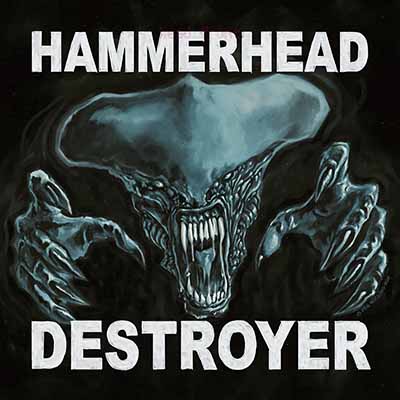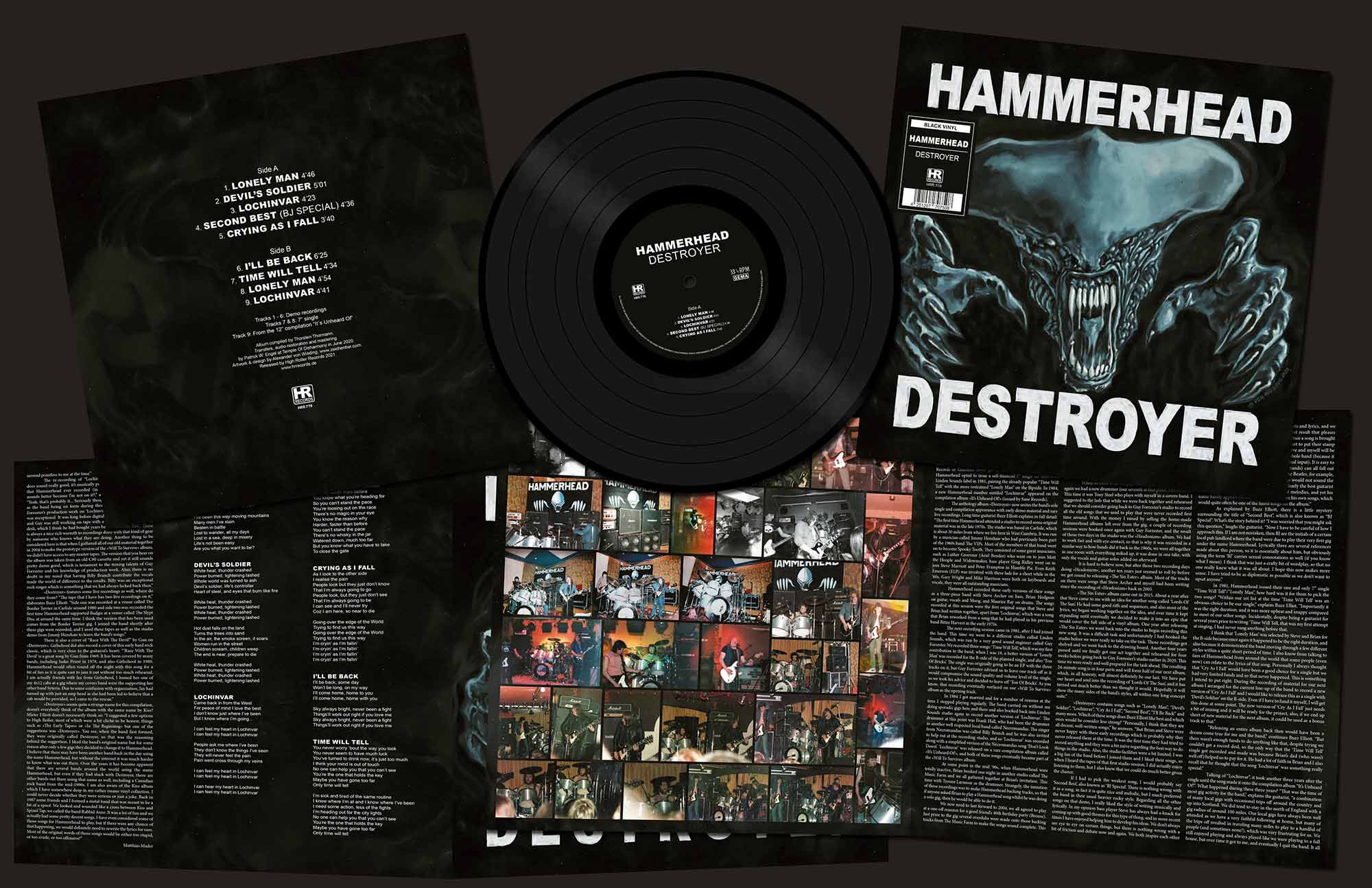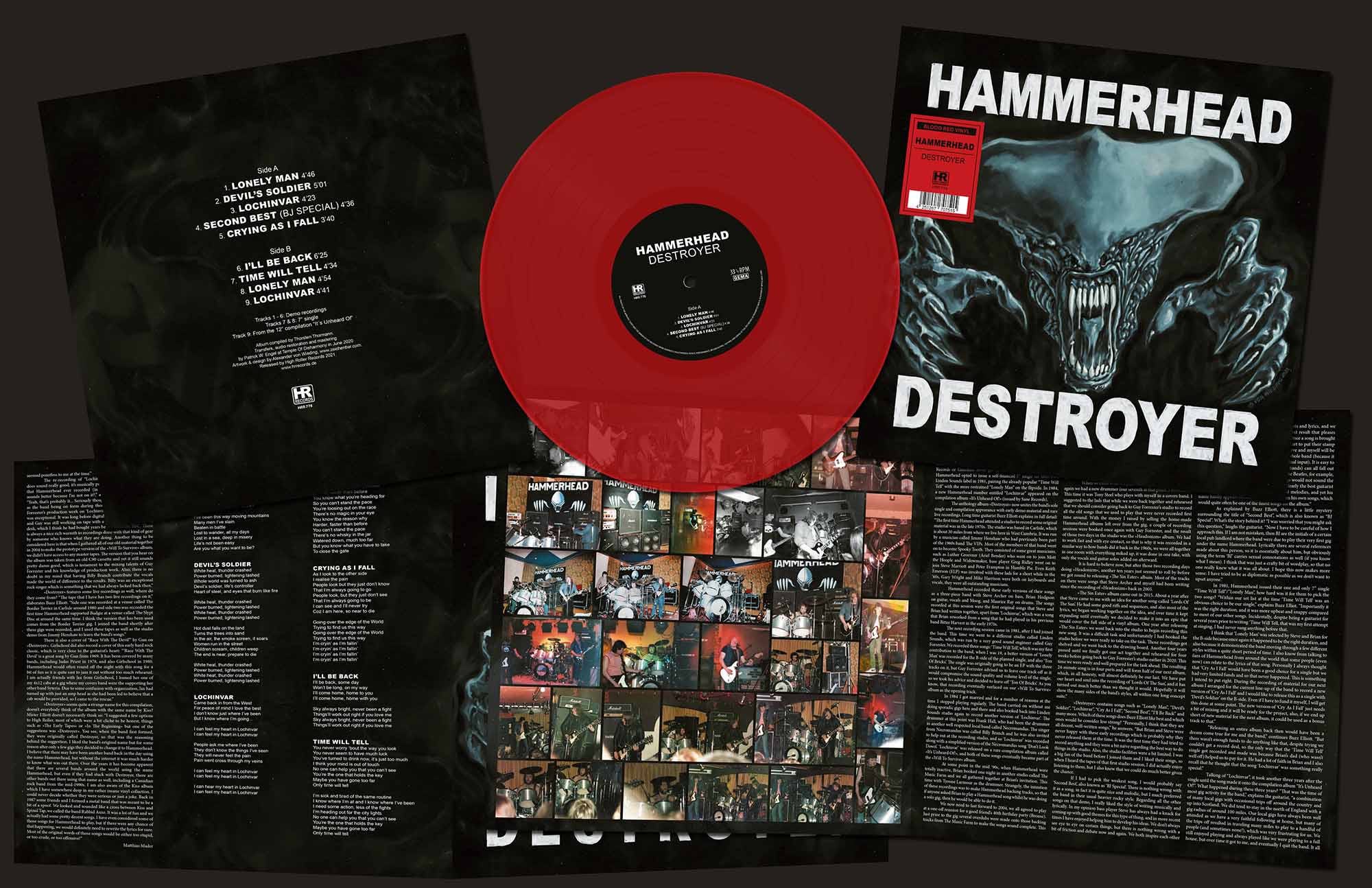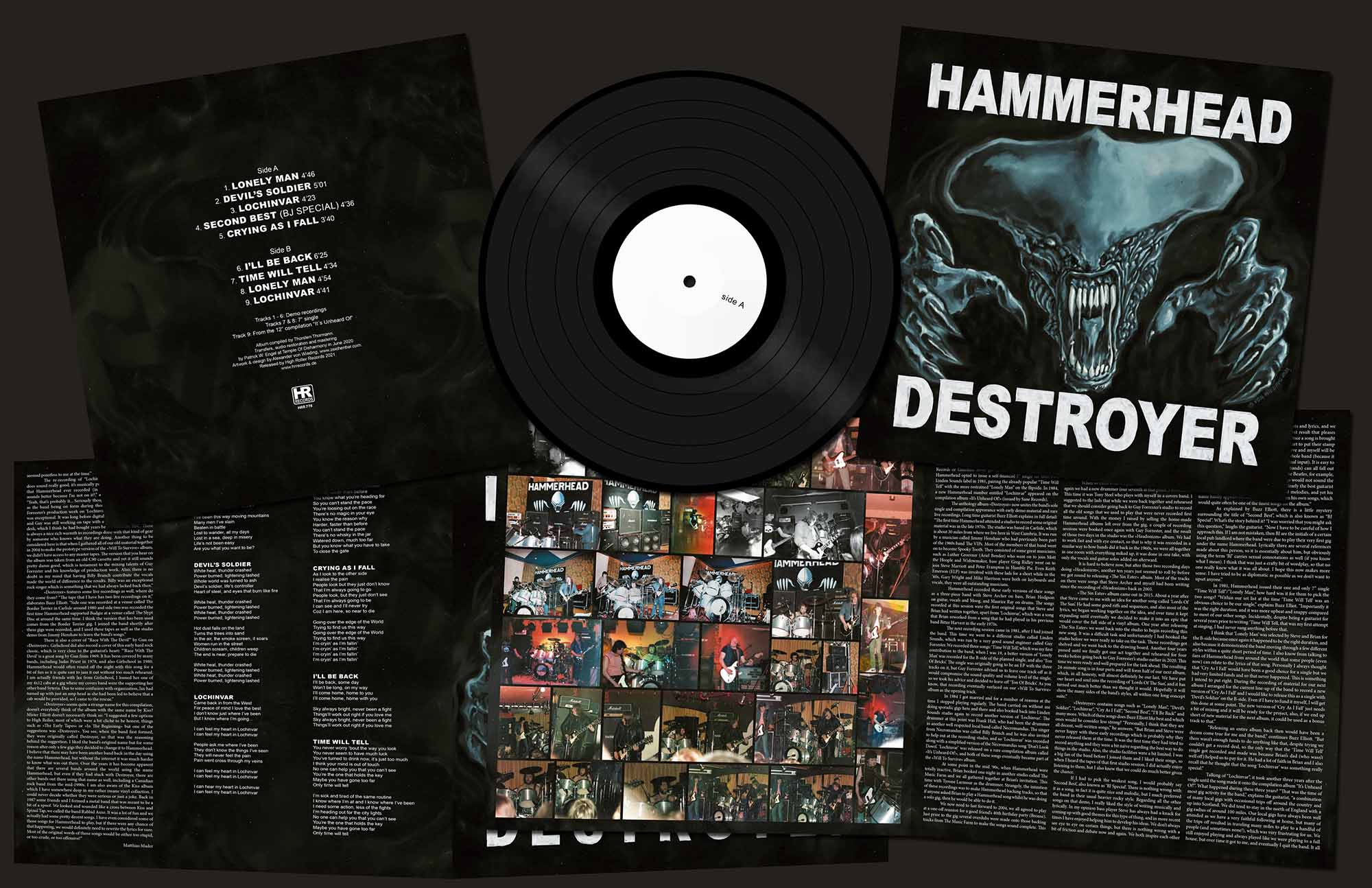 | ||||
| HAMMERHEAD - Destroyer LP | |
HRR 778LP, ltd 300, 150 x black + 150 x transparent blood-red vinyl, 4 page insert | |
| 1. Lonely Man 2. Devil’s Soldier 3. Lochinvar 4. Second Best (BJ Special) 5. Crying as I Fall 6. I’ll Be Back 7. Time Will Tell 8. Lonely Man 9. Lochinvar | |
| Tracks 1 - 6: Demo recordings Tracks 7 & 8: 7” single Track 9: From the 12” compilation “It´s Unheard Of” | |
AVAILABLE | |
Transfer, audio restoration and mastering by Patrick W. Engel at TEMPLE OF DISHARMONY in June 2020.
Cumbria’s Hammerhead were one of the most talented outfits to evolve from the New Wave Of British movement of the late 1970s. They came together at the turn of the decade after the demise of various small-time acts such as Judas, Bitter Harvest and 8 Hertz. After a few tentative appearances on the regional club scene in the early days, the group first came to public attention via a well-received demo tape. Although their signature tune “Time Will Tell” gathered some very encouraging local response, labels like Neat, Heavy Metal Records or Guardian never got in contact with the band. Instead Hammerhead opted to issue a self-financed 7” single on their own Linden Sounds label in 1981, pairing the already popular “Time Will Tell” with the more restrained “Lonely Man” on the flipside. In 1984, a new Hammerhead number entitled “Lochinvar” appeared on the compilation album »It’s Unheard Of!« (issued by Sane Records).
The anthology album »Destroyer« now unites the band’s sole single and compilation appearance with early demo material and rare live recordings. Long time guitarist Buzz Elliott explains in full detail: “The first time Hammerhead attended a studio to record some original material was in the late 1970s. The studio was based in Carlisle, which is about 30 miles from where we live here in West Cumbria. It was run by a musician called Jimmy Henshaw who had previously been part of the 1960s band The VIPs. Most of the members of that band went on to become Spooky Tooth. They consisted of some great musicians, such as Luther Grosvner (Ariel Bender) who went on to join Mott the Hoople and Widowmaker, bass player Greg Ridley went on to join Steve Marriott and Peter Frampton in Humble Pie. Even Keith Emerson (ELP) was involved with these lads for a short while in the ‘60s, Gary Wright and Mike Harrison were both on keyboards and vocals, they were all outstanding musicians.
Hammerhead recorded these early versions of their songs as a three-piece band with Steve Archer on bass, Brian Hodgson on guitar, vocals and Moog, and Maurice Ray on drums. The songs recorded at this session were the first original songs that Steve and Brian had written together, apart from ‘Lochinvar’, which was a song that Brian reworked from a song that he had played in his previous band Bitter Harvest in the early 1970s.
The next recording session came in 1981, after I had joined the band. This time we went to a different studio called Linden Sounds, which was run by a very good sound engineer called Guy Forrester. We recorded three songs: ‘Time Will Tell’, which was my first contribution to the band, when I was 19, a better version of ‘Lonely Man’ was recorded for the B-side of the planned single, and also ‘Ton Of Bricks’. The single was originally going to be an EP with the three tracks on it, but Guy Forrester advised us to leave one track off as it would compromise the sound quality and volume level of the single, so we took his advice and decided to leave off ‘Ton Of Bricks’. As you know, that recording eventually surfaced on our »Will To Survive« album as the opening track.
In 1984 I got married and for a number of reasons at the time I stopped playing regularly. The band carried on without me doing sporadic gigs here and there and also booked back into Linden Sounds studio again to record another version of ‘Lochinvar’. The drummer at this point was Frank Hall, who had been the drummer in another well respected local band called Necromandus. The singer from Necromandus was called Billy Branch and he was also invited to help out at the recording studio, and so ‘Lochinvar’ was recorded along with a simplified version of the Necromandus song ‘Don’t Look Down’. ‘Lochinvar’ was released on a rare compilation album called »It’s Unheard Of!«, and both of these songs eventually became part of the »Will To Survive« album.
At some point in the mid ‘90s, when Hammerhead were totally inactive, Brian booked one night in another studio called The Music Farm and we all gathered together at Brian’s invitation. This time with Tyrone Larmour as the drummer. Strangely, the intention of these recordings was to make Hammerhead backing tracks, so that if anyone asked Brian to play a Hammerhead song whilst he was doing a solo gig, then he would be able to do it.
We now need to fast forward to 2004, we all agreed to play at a one-off reunion for a good friend’s 40th birthday party (Bronse). Just prior to the gig several overdubs were made onto those backing tracks from The Music Farm to make the songs sound complete. This was done mainly by myself in my home studio in an attempt to get enough songs together to make a home-made Hammerhead album to sell at the gig. To cut a long story short, that is what eventually became the »Will To Survive« album that was initially released by Sonic Age Records in Greece on CD, and later on in the vinyl format by High Roller Records. Had I known how things would all play out, I would certainly have done the track listing differently, for example, I would not have included ‘Heavy Handed’ or the live version of ‘BJ Special’. Unfortunately at that time, I had used up every possible studio recording that we had available, so I had to fill it out with something.
When we came to do the gig, in true Spinal Tap tradition once again we had a new drummer (our seventh at that point, I do believe). This time it was Tony Steel who plays with myself in a covers band. I suggested to the lads that while we were back together and rehearsed that we should consider going back to Guy Forrester’s studio to record all the old songs that we used to play that were never recorded first time around. With the money I raised by selling the home-made Hammerhead albums left over from the gig, a couple of recording sessions were booked once again with Guy Forrester, and the result of those two days in the studio was the »Headonizm« album. We had to work fast and with eye contact, so that is why it was recorded in a similar way to how bands did it back in the 1960s, we were all together in one room with everything miked up, it was done in one take, with only the vocals and guitar solos added on afterward.
It is hard to believe now, but after those two recording days doing »Headonizm«, another ten years just seemed to roll by before we got round to releasing »The Sin Eater« album. Most of the tracks on there were songs that Steve Archer and myself had been writing since the recording of »Headonizm« back in 2005.
»The Sin Eater« album came out in 2015. About a year after that Steve came to me with an idea for another song called ‘Lords Of The Sun’. He had some good riffs and sequences, and also most of the lyrics, we began working together on the idea, and over time it kept expanding until eventually we decided to make it into an epic that would cover the full side of a vinyl album. One year after releasing »The Sin Eater« we went back into the studio to begin recording this new song. It was a difficult task and unfortunately I had booked the studio before we were ready to take on the task. Those recordings got shelved and we went back to the drawing board. Another four years passed until we finally got our act together and rehearsed for four weeks before going back to Guy Forrester’s studio earlier in 2020. This time we were ready and well prepared for the task ahead. The resulting 24-minute song is in four parts and will form half of our next album, which, in all honesty, will almost definitely be our last. We have put our heart and soul into the recording of ‘Lords Of The Sun’, and it has turned out much better than we thought it would. Hopefully it will show the many sides of the band’s styles, all within one long concept suite.”
»Destroyer« contains songs such as “Lonely Man”, “Devil's Soldier”, “Lochinvar”, “Cry As I Fall”, “Second Best”, ”I'll Be Back” and many more. Which of these songs does Buzz Elliott like best and which ones would he consider less strong? “Personally, I think that they are all decent, well-written songs,” he answers. “But Brian and Steve were never happy with these early recordings which is probably why they never released them at the time. It was the first time they had tried to record anything and they were a bit naďve regarding the best way to do things in the studio. Also, the studio facilities were a bit limited. I was a big fan of the band before I joined them and I liked their songs, so when I heard the tapes of that first studio session, I did actually enjoy listening to them, but I also knew that we could do much better given the chance.
If I had to pick the weakest song, I would probably say ‘Second Best’, also known as ‘BJ Special’. There is nothing wrong with it as a song, in fact it is quite nice and melodic, but I much preferred the band in their usual heavier rocky style. Regarding all the other songs on that demo, I really liked the style of writing musically and lyrically. In my opinion bass player Steve has always had a knack for coming up with good themes for this type of thing, and in more recent times I have enjoyed helping him to develop his ideas. We don’t always see eye to eye on certain things, but there is nothing wrong with a bit of friction and debate now and again. We both inspire each other with song ideas and suggestions for arrangements and lyrics, and we also have to make compromises to find the best result that pleases each other and also everyone else in the band. Once a song is brought to the table, that is when the other members start to put their stamp on it, so a song that is essentially written by Steve and myself will be classed as written by us, but arranged by the whole band (because it wouldn’t sound as it does without their individual input). It is easy to understand how some people (especially top bands) can all fall out due to writing credits of their songs. Look at The Beatles, for example, how many great Lennon and McCartney songs would not sound the way they do without George’s input? He was clearly the best guitarist in the band, and always full of great ideas and melodies, and yet his name hardly appears on any of them, apart from his own songs, which would quite often be one of the finest songs on the album.”
As explained by Buzz Elliott, there is a little mystery surrounding the title of “Second Best”, which is also known as “BJ Special”. What’s the story behind it? “I was worried that you might ask this question,” laughs the guitarist. “Now I have to be careful of how I approach this. If I am not mistaken, then BJ are the initials of a certain local pub landlord where the band were due to play their very first gig under the name Hammerhead. Lyrically there are several references made about this person, so it is essentially about him, but obviously using the term ‘BJ’ carries sexual connotations as well (if you know what I mean). I think that was just a crafty bit of wordplay, so that no one really knew what it was all about. I hope this now makes more sense. I have tried to be as diplomatic as possible as we don’t want to upset anyone.”
In 1981, Hammerhead issued their one and only 7” single “Time Will Tell”/”Lonely Man”, how hard was it for them to pick the two songs? “Within our set list at the time ‘Time Will Tell’ was an obvious choice to be our single,” explains Buzz Elliot. “Importantly it was the right duration, and it was more upbeat and snappy compared to most of our other songs. Incidentally, despite being a guitarist for several years prior to writing ‘Time Will Tell, that was my first attempt at singing, I had never sung anything before that.
I think that ‘Lonely Man’ was selected by Steve and Brian for the B-side because once again it happened to be the right duration, and also because it demonstrated the band moving through a few different styles within a quite short period of time. I also know from talking to fans of Hammerhead from around the world that some people (even now) can relate to the lyrics of that song. Personally I always thought that ‘Cry As I Fall’ would have been a good choice for a single but we had very limited funds and so that never happened. This is something I intend to put right. During the recording of material for our next album I arranged for the current line-up of the band to record a new version of ‘Cry As I Fall’ and I would like to release this as a single with ‘Devil’s Soldier’ on the B-side. Even if I have to fund it myself, I will get this done at some point. The new version of ‘Cry As I Fall’ just needs a bit of mixing and it will be ready for the project, also, if we end up short of new material for the next album, it could be used as a bonus track to that.”
“Releasing an entire album back then would have been a dream come true for me and the band,” continues Buzz Elliott. “But there wasn’t enough funds to do anything like that, despite trying we couldn’t get a record deal, so the only way that the ‘Time Will Tell’ single got recorded and made was because Brian’s dad (who wasn’t well off) helped us to pay for it. He had a lot of faith in Brian and I also recall that he thought that the song ‘Lochinvar’ was something really special.”
Talking of “Lochinvar”, it took another three years after the single until the song made it onto the compilation album “It's Unheard Of!”. What happened during these three years? “That was the time of most gig activity for the band,” explains the guitarist, “a combination of many local gigs with occasional trips off around the country and up into Scotland. We did tend to stay in the north of England with a gig radius of around 100 miles. Our local gigs have always been well attended as we have a very faithful following at home, but many of the trips off resulted in traveling many miles to play to a handful of people (and sometimes none!), which was very frustrating for us. We still enjoyed playing and always played like we were playing to a full house, but over time it got to me, and eventually I quit the band. It all seemed pointless to me at the time.”
The re-recording of “Lochinvar” on »It’s Unheard Of!« does sound really good, it's musically probably the strongest number that Hammerhead ever recorded (in the early days). “Maybe it sounds better because I’m not on it?,” asks Buzz Elliott and smiles. “Yeah, that’s probably it... Seriously though, I do believe that as well as the band being on form during those recording sessions, Guy Forrester’s production work on ‘Lochinvar’ and ‘Don’t Look Down’ was exceptional. It was long before digital recording had taken over and Guy was still working on tape with a big old fashioned mixing desk, which I think he had bought years before from the BBC. There is always a nice rich warmth to recordings done with that kind of gear by someone who knows what they are doing. Another thing to be considered here is that when I gathered all of our old material together in 2004 to make the prototype version of the »Will To Survive« album, we didn’t have access to any master tapes. The version that you hear on the album was taken from an old C90 cassette and yet it still sounds pretty damn good, which is testament to the mixing talents of Guy Forrester and his knowledge of production work. Also, there is no doubt in my mind that having Billy Branch contribute the vocals made the world of difference to the results. Billy was an exceptional rock singer which is something that we had always lacked back then.”
»Destroyer« features some live recordings as well, where do they come from? “The tape that I have has two live recordings on it,” elaborates Buzz Elliott. “Side one was recorded at a venue called The Border Terrier in Carlisle around 1980 and side two was recorded the first time Hammerhead supported Budgie at a venue called The Slypt Disc at around the same time. I think the version that has been used comes from the Border Terrier gig. I joined the band shortly after these gigs were recorded, and I used these tapes as well as the studio demo from Jimmy Henshaw to learn the band’s songs.”
There is also a cover of “Race With The Devil'” by Gun on »Destroyer«. Girlschool did also record a cover of this early hard rock classic, which is very close to the guitarist’s heart: “’Race With The Devil’ is a great song by Gun from 1969. It has been covered by many bands, including Judas Priest in 1978, and also Girlschool in 1980. Hammerhead would often round off the night with this song for a bit of fun as it is quite east to jam it out without too much rehearsal. I am actually friends with Jax from Girlschool, I loaned her one of my 4x12 cabs at a gig where my covers band were the supporting her other band Syteria. Due to some confusion with organization, Jax had turned up with just an amp head as she had been led to believe that a cab would be provided, so I came to the rescue.”
»Destroyer« seems quite a strange name for this compilation, doesn’t everybody think of the album with the same name by Kiss? Mister Elliott doesn’t necessarily think so: “I suggested a few options to High Roller, most of which were a bit cliché to be honest, things such as »The Early Tapes« or »In The Beginning« but one of the suggestions was »Destroyer«. You see, when the band first formed, they were originally called Destroyer, so that was the reasoning behind the suggestion. I liked the band’s original name but for some reason after only a few gigs they decided to change it to Hammerhead. I believe that there may have been another band back in the day using the name Hammerhead, but without the internet it was much harder to know what was out there. Over the years it has become apparent that there are several bands around the world using the name Hammerhead, but even if they had stuck with Destroyer, there are other bands out there using that name as well, including a Canadian rock band from the mid-1990s. I am also aware of the Kiss album which I have somewhere deep in my rather insane vinyl collection. I could never decide whether they were serious or just a joke. Back in 1987 some friends and I formed a metal band that was meant to be a bit of a spoof. We looked and sounded like a cross between Kiss and Spinal Tap, we called the band Rabbid Axxe. It was a lot of fun and we actually had some pretty decent songs. I have even considered some of those songs for Hammerhead to play, but if there were any chance of that happening, we would definitely need to rewrite the lyrics for sure. Most of the original words of those songs would be either too stupid, or too crude, or too offensive!”
Matthias Mader


